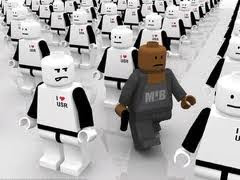The company faces two challenges: Apple is pressuring it to keep prices low for the latest generation of products it is outsourcing in China. This means that Foxconn's pricing options are limited. Simultaneously, Apple is acutely aware of the fact that its pressure has contributed to the conditions that led to the suicides. This redounds poorly and could at some point have a corrosive impact on sales. Nike learned this the hard way when its subcontracting policies in Asia were exposed. Apple's selling proposition depends on perceptions of its galactic cool. Foxconn's problems sully its brand, which may make Foxconn expendable even if it offers the lowest price contract.
The company tried moving production to China's hinterland but its reputation preceeded it - and China is facing something of a demographic skilled worker shortage to begin with. Robots may be the answer to the reputation and price issues in the short term. But as Erik Sherman reports in BNet, Chinese consumers are central to Apple's growth strategy. If your workers can not afford your products, your market is self-limiting. Hnery Ford figured this out over 100 years ago. It is not clear that Apple has learned that lesson - yet. JL:
Foxconn — known for building Apple (AAPL) products as well as worker suicides and labor strikes — will incorporate more robots in its manufacturing. A lot more — upwards of 1 million over the next three years, according to a report in the China Business News.
The goal is to go from 10,000 this year to 300,000 next, all in hopes of containing growing labor costs. But a more accurate formulation might be in an effort to keep the Apple business that has helped fuel Foxconn’s growth. The same pressures that high tech corporations bring elsewhere in their cost structures also lands in Asia, where so many electronics products are actually built. Not only does Foxconn face Apple’s tight-fisted squeeze, but it has become a magnet for bad publicity, something that Steve Jobs clearly doesn’t need or want.
It’s going to take some persuasion to keep those critical, high-volume manufacturing lines cranking out product.
At least 17 workers have dies at Foxconn since January 2010, most of them by suicide. Company officials says that they don’t know why the deaths occur this year:
Ask around among the more than 250,000 workers at the Shenzhen complex, and you’ll find explanations. One 21-year-old assembly-line worker, who asked that his name not be used, says conditions at Foxconn make his life seem meaningless. He says conversation on the production line is forbidden, bathroom breaks are kept to 10 minutes every two hours, and workers get yelled at frequently.
Maybe that’s why workers have been striking and demanding more pay — The reason Foxconn gets the business from Apple, as well as Dell, Microsoft (MSFT), and others is because it under cuts prices from competitors. Even small amounts add up when a company is purchasing millions of units.
Apple has already begun to ratchet the pricing pressure by opening bidding to make the iPad 3. One report says that Taiwan-based contract manufacturer Pegatron under bid Foxconn. The company also supposedly got the iPhone 5 nod.
Companies have already gone to the ends of the earth to find cheap labor. Now the only option is to ramp up automation and cut out as many jobs as possible. But where’s the future in all this, after all the major manufacturers reduce people to a minimum?
The problem ultimately facing high tech and other industries is that the idea of zero labor costs translates into a global workforce that doesn’t make enough to buy the products that keep companies afloat. What happens then? Or doesn’t it matter because it will be someone else’s problem at that point? Other than “Let them eat cake,” ever wonder what the court of Louis XVI said about the working class?




















0 comments:
Post a Comment